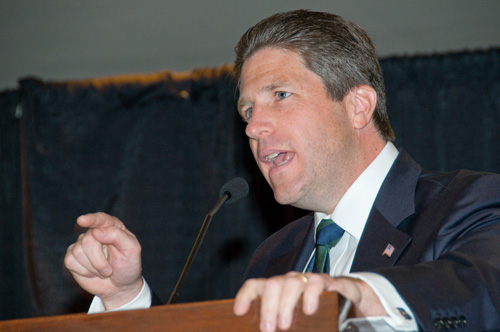The real fix for stop-and-frisk
Hire more officers and end the quotas.
By Patrick J. Lynch, President, New York City Patrolmen’s Benevolent Association (PBA)
After nearly a decade of debate surrounding the NYPD’s policies on stop, question and frisk — a more accurate phrase than “stop and frisk” — our current political leaders have had ample time to make their mark.
But with two misguided laws and a federal monitor now in place, their only real accomplishment has been to obscure the path to a resolution.
It will fall to the next mayor and commissioner and new City Council members to restore the public’s trust in the NYPD without returning us to the “bad old days” of hesitant, reactive policing.
The answer lies not in enforcing a judge’s ruling or listening to an inspector general — but in repairing the damage that two major policy shifts of the last decade have wrought where the policing rubber meets the road. Those two shifts: sharply reduced staffing and an increased emphasis on quotas.
The NYPD is understaffed. Over the past 14 years, while the city’s population has grown and police officers’ counterterrorism duties and other responsibilities have increased dramatically, budget cuts have depleted the department’s ranks by nearly 7,000 uniformed members. In budget after budget, the current administration and City Council have reduced head count by attrition and slashed recruiting targets, even as the overall city workforce has grown during the same period. And the decline in staffing might soon accelerate — within the next several years, thousands of police officers hired under the Safe City, Safe Streets program in the early 1990s will become eligible for retirement.
While staffing has dwindled, the pressure to keep New York the safest big city in America has only increased. How do you do more with less? NYPD leadership has erroneously tried to answer the question by imposing quotas. Though they have denied it, we’re convinced that is what drove the past dramatic increase in stop, question and frisk activity.
Police managers, in order to address the conditions created by inadequate staffing, resorted to demanding cops hit specified targets for activity — despite the fact that quotas are illegal under New York State Labor Law — and have disciplined or reassigned officers who fail to meet them.
Quotas are the worst possible way to try to produce more effective policing. They risk turning officers into automatons and fuel predictable, pervasive distrust between cops and communities.
The PBA has been at the forefront of combating the damaging effects of quotas for more than a decade, having first proven their existence in an arbitration filed on behalf of officers in Brooklyn.
In 2010, we successfully backed state legislation to expand the existing anti-quota law, which originally covered only traffic violations. These efforts, unfortunately, received little public support from current City Council members and have been actively opposed by the current administration.
Though some stop-and-frisk opponents acknowledge the role that understaffing and quotas have played in the department’s overuse of the tactic, their proposed remedies provide no mandate to abolish quotas or increase staffing.
Instead, they simply transfer the burden of these failed policies to individual police officers in the form of bureaucratic second-guessing, increased legal liability and a disturbing reinterpretation of a time-tested and constitutional law enforcement tool that has undoubtedly saved the lives of many citizens and police officers.
Even more disturbing is their readiness to present a statistical disparity in the impact of these policies as evidence of a pervasive racial bias, “unconscious” or otherwise, among rank-and-file officers.
It’s one thing to assert that police officers, pressured by management directives to reach numerical benchmarks, may at times have misapplied their discretion. It’s quite another to accuse them — a majority of whom reside within the five boroughs and are members of the communities they police — of a wholesale violation of constitutional rights, motivated by racial prejudice, in the communities most in need of police resources. These accusations only widen the gulf between police officers and the communities we faithfully serve and risk our lives every day to protect. To make any real progress, the city’s new mayor will need an understanding of the street-level impact of the solutions they propose.
Unless and until police officers have the strength in numbers and the unpressured discretion they need to do their jobs effectively, it will be impossible to reduce the strain on community relations without placing those same communities at greater risk.
Patrick Lynch is president of the New York City Patrolmen’s Benevolent Association.















